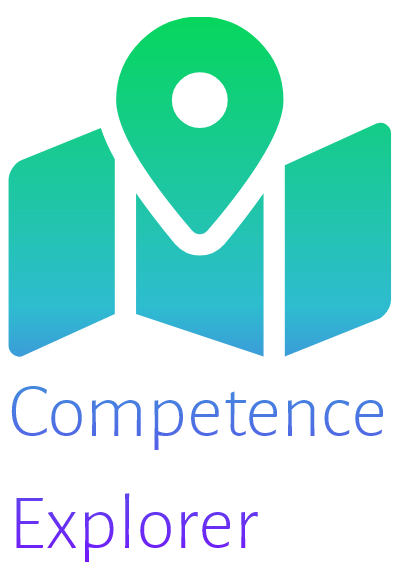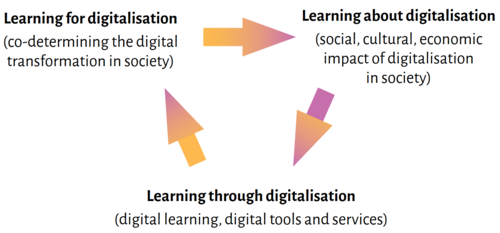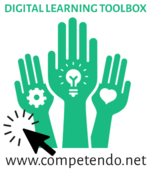What Competency-based learning is...
Reasons for Competence-based Democracy Learning
We might conclude, that education and qualification needs to respond to that observation and cover the broad range of experience, attitudes, book-knowledge and skills that one has and needs for his or her active and autonomously shaped life.
Reasons for Competency Based Learning
- Considers all learners’ experience of diverse situations, roles and life phases as a relevant resource.
- Goes beyond knowledge-centred teaching to understand competence as knowledge and critical understanding, skills, attitudes, behaviours and values, and an understanding of how they interact.
- Takes the individual learner seriously and tailors the learning design to their needs.
- Strengthens individual ownership of their learning biography.
- Sees learning as a social and cooperative process – between classroom and real life, formal, non-formal and informal learning, and between sectors.
- Appreciates the diversity of perspectives and learning styles in a group as a potential (instead of trying to even these qualities). Is relevant, because it allows learners to apply their abilities in many different social roles and situations.
- Is flexible, because it understands learning as a process instead of forcing it into an overly linear curriculum.
...and 5 Problematic Practices
Beyond all missionary words we need to acknowledge, that competency based learning is not always easy to implement. It is often a disruptive element in the learning culture of a school, of an academy or an organization. Changes are never easy and dilemmas appear between old proven and new risky ways of educating and unclarity about how they might go together. For instance:
What Competency-centered Learning Should Not Be
- A new layer of bureaucracy: It's intended to give learners and teachers more freedom instead more rules or procedures. It requires flexible teachers/facilitators and more freedom for learners.
- Tailorist instead tailor-made learning: It's a humanist and holistic approach aiming to support autonomy, not usability. However, some promoters of competencies misunderstand competency-learning as emphasizing on skill training only.
- Optimization without development: Competency is not a self-optimization tool nor for assessing the fittest or increasing competitiveness. They are an instrument for individual and free personal development.
- Doing without thinking: Competence-centered learning involves knowledge, attitude and skills. But some understand that it is a practice-only approach. However, successful action is not possible without the ability of a learner to assess and reflect on activities and goals.
Democratic Learning in (Digital) Transformation
Human-centered social change requires individuals feeling capable to address challenges and to co-create a situation in an often ambigous and open context. A transversal understanding of learning is becoming crucial in here, helping learners in mobilising knowledge, skills and attitudes acquired in diverse contexts and social roles. In this perspective the meaning of competence "involves the ability to meet complex demands, by drawing on and mobilizing psychosocial resources (including skills and attitudes) in a particular context" (OECD).
Competence (OECD)
"(Competence)involves the ability to meet complex demands, by drawing on and mobilizing psychosocial resources (including skills and attitudes) in a particular context." (OECD)
Key Competences for Lifelong Learning
"Competences are defined as a combination of knowledge, skills and attitudes, where:
- knowledge is composed of the facts and figures, concepts, ideas and theories which are already established and support the understanding of a certain area or subject;
- skills are defined as the ability and capacity to carry out processes and use the existing knowledge to achieve results;
- attitudes describe the disposition and mind-sets to act or react to ideas, persons or situations." (EU Key Competences for Lifelong Learning
The digital transformation is one example, illustrating how our learning concepts and understanding of education might change toward a holistic perspective.
Holistic Digital Transformation Learning
- Learning for digitalisation: co-determining the digital transformation in society.
- Learning about digitalisation: social, cultural, economic impact of digitalisation in society.
- Learning through digitalisation: digital learning, digital tools and services.
Perspective of Democratic Learning
- Democracy as a form of governance, including principles, structures and rights.
- Democracy as a form of living and learning, including democratic attitudes and habits.
- Democracy as a form of society, including social and participatory processes and relations.
Articles
Also interesting:
 Overview of different competence frameworks relevant to lifelong learning.
Online
Overview of different competence frameworks relevant to lifelong learning.
Online
Download: Banner
DEFINITION:
"A competency is more than just knowledge and skills. It involves the ability to meet complex demands, by drawing on and mobilizing psychosocial resources (including skills and attitudes) in a particular context."
Related:











